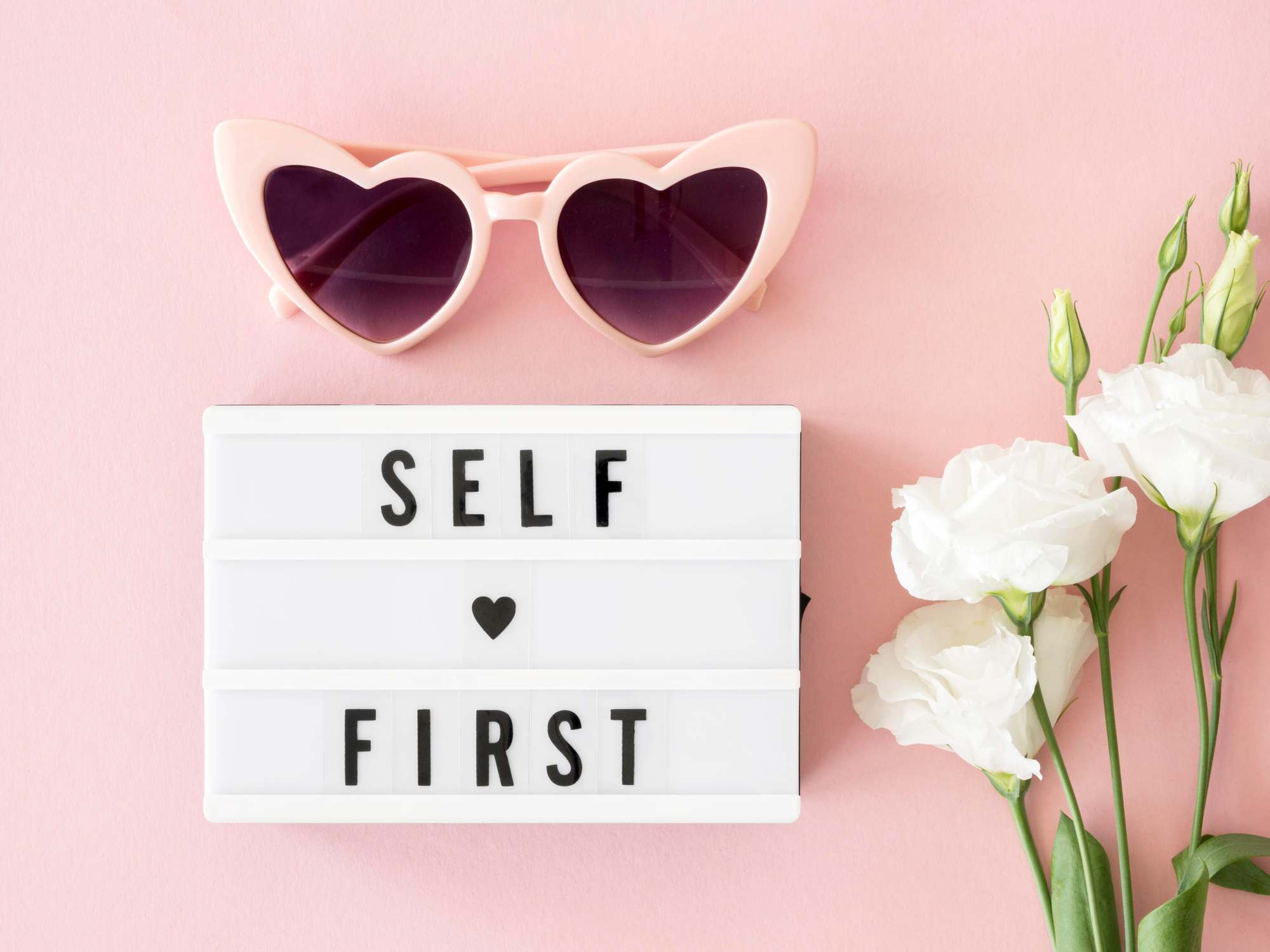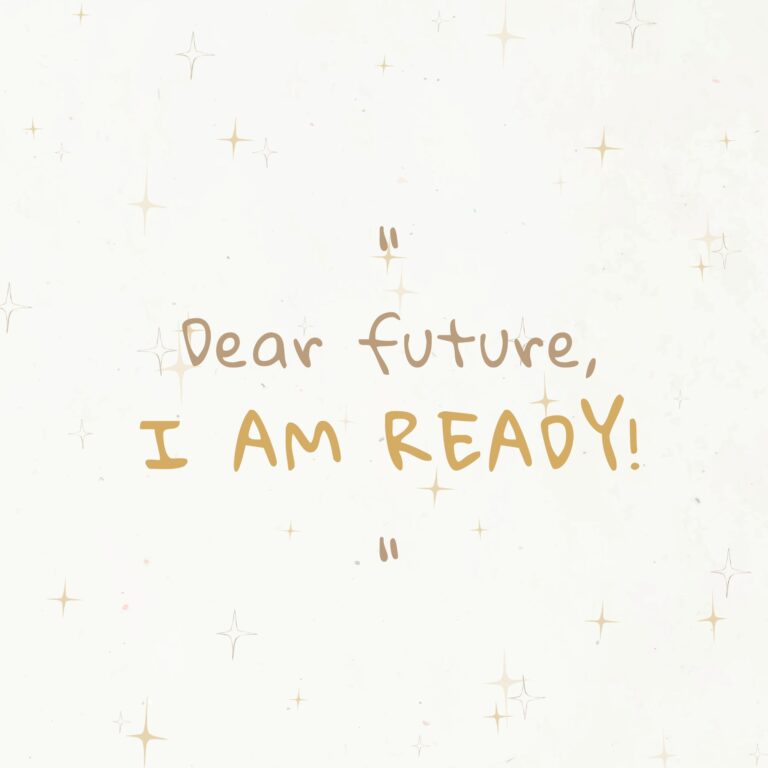How to build a healthy relationship with yourself
You’ll spend more time with yourself than anyone else in your entire life. Yet most of us treat ourselves worse than we’d treat a stranger. We criticize every mistake, ignore our needs, and expect perfection while offering ourselves zero compassion.
Think about it – when was the last time you spoke to yourself with the same kindness you’d show a friend going through a hard time? If you’re like most people, you probably can’t remember.
We spend so much energy perfecting our relationships with others that we completely neglect the most important one. The relationship you have with yourself isn’t just nice to have – it’s the foundation everything else is built on.
Why building a healthy relationship with yourself changes everything
What I’ve learned is – how you treat yourself becomes the blueprint for how everyone else treats you. But it goes deeper than that.
It shapes how others see you: When you respect your own boundaries and speak to yourself with kindness, you teach others how you deserve to be treated. You stop accepting behavior that you’d never tolerate if someone treated your best friend that way.
It makes decisions clearer: When you trust yourself, decision-making becomes less agonizing. You stop second-guessing every choice because you know you can handle whatever comes next.
It changes how you handle difficult moments: Instead of that harsh inner critic taking over when things go wrong, you have a supportive voice that helps you find solutions instead of reasons to give up.
You’re the one person you’ll never escape. Isn’t it time you made that relationship one that actually supports you?
Reflection:
- How do I treat myself right now, and how is it affecting everything else in my life?
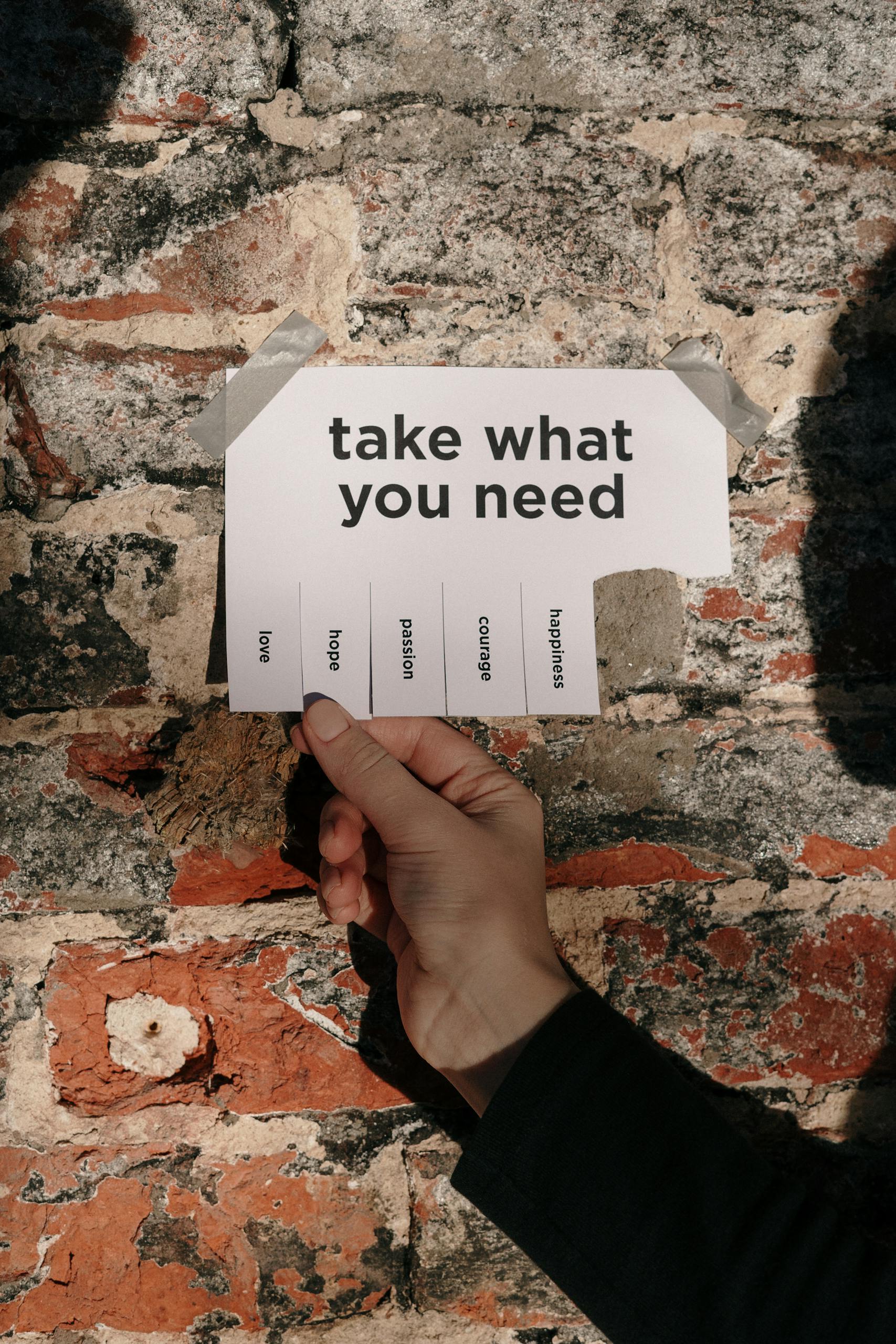
Signs you’re not treating yourself well
Recognizing where things need work is the first step toward change. Here are the patterns that show your relationship with yourself needs attention:
Harsh inner dialogue: You criticize yourself for mistakes that you’d easily forgive in others. That voice in your head is meaner than you’d ever be to someone you care about.
Example: When you make a small mistake at work, your inner voice says “You’re so stupid, everyone probably thinks you’re incompetent” instead of “That was a learning moment, and everyone makes mistakes.”
Ignoring your own needs: You’re so busy taking care of everyone else that you’ve forgotten what you actually need. Your emotional, physical, and mental well-being comes last on your priority list.
Example: You consistently skip meals when busy, stay up late to help others with their problems, or cancel your own plans whenever someone else needs something.
Boundary struggles: Saying no feels impossible, even when saying yes leaves you drained and resentful. You give until you’re empty and then feel guilty for having nothing left.
Example: You agree to work late every time your boss asks, even though you’re exhausted, because saying no feels selfish or wrong.
Disconnection from yourself: You’ve ignored your inner voice for so long that you genuinely don’t know what you want or need anymore.
Example: When someone asks what you want for dinner or how you want to spend your weekend, you draw a complete blank because you’ve stopped paying attention to your preferences.
If any of these sound familiar, you’re not broken. You’ve just been practicing self-criticism for so long that it feels normal.
Reflection:
- What patterns make me feel like I’m not prioritizing my relationship with myself?
How to build a healthy relationship with yourself
Step 1: Practice self-compassion (but make it real)
Self-compassion isn’t about lowering your standards or making excuses. It’s about speaking to yourself like someone who’s on your side.
Instead of: “I always mess things up.”
Try: “I’m learning, and learning means making mistakes.”
Instead of: “I’m so behind everyone else.”
Try: “I’m moving at my own pace, and that’s exactly where I need to be.”
The self-compassion test: Before you say something to yourself, ask: “Would I say this to my best friend going through the same situation?” If the answer is no, reframe it.
Example: You forget an important deadline. Instead of spiraling into “I’m so irresponsible and unreliable,” try “I made a mistake, and I can learn from this. Let me see how to handle it moving forward.”
Affirmation: “I deserve the same kindness I give to others.”
Practice tip: When you catch that critical voice starting, pause. Take a breath. Ask yourself: “What would I say to a friend in this situation?” Then say that to yourself instead.
The way you speak to yourself shapes everything. If you struggle with negative self-talk, our practical guide to positive self-talk provides specific techniques to transform your inner dialogue and build a more supportive relationship with yourself.
Reflection:
- What’s one way I can show myself more compassion today?
Step 2: Spend quality time with yourself
Just like any relationship, this one needs attention and care. Quality time with yourself isn’t selfish – it’s necessary.
Try these intentional practices:
Unstructured journaling: Set a timer for 10 minutes and write whatever comes to mind. No agenda, no goals, just letting your thoughts flow onto paper.
Mindful solo walks: Leave your phone at home and take a 15-minute walk. Notice what you see, hear, and feel instead of getting lost in mental chatter.
Joy-based activities: Do something purely because it brings you happiness, not because it’s productive. This might be dancing to your favorite song, drawing, or reading fiction.
Digital-free mornings: Spend the first 30 minutes of your day without checking your phone. Use this time to check in with yourself instead of immediately absorbing everyone else’s energy.
Why it matters: These moments help you remember who you are when you’re not performing for others or checking items off a list. You start to enjoy your own company instead of constantly seeking external validation or distraction.
Creating small, meaningful moments for yourself doesn’t have to be complicated. Our guide to 5-minute rituals shows you how tiny daily practices can transform your relationship with yourself and create lasting positive change.
Reflection:
- When was the last time I spent quality time with myself? How can I make space for more of that?
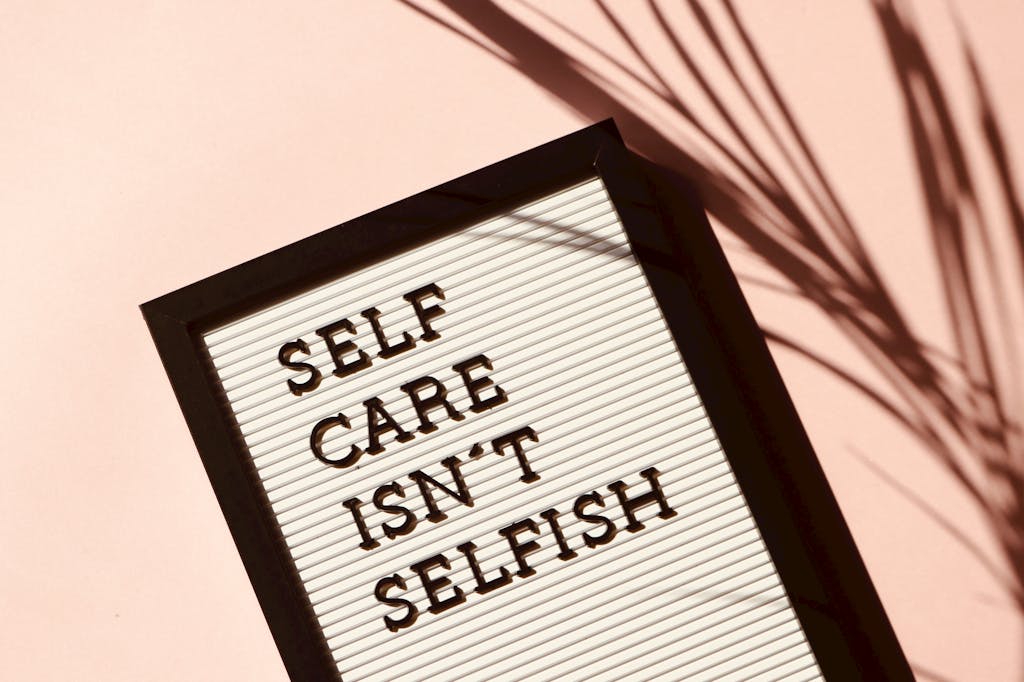
Step 3: Actually listen to your needs
Most people are so disconnected from their needs that they wouldn’t recognize them if they came with neon signs attached.
How to start: Ask yourself “What do I need right now?” and then actually honor the answer. Whether it’s rest, movement, creative time, or connection – your needs matter.
The four categories of needs:
Physical needs: Rest when you’re tired, eat when you’re hungry, move when you’re restless, seek comfort when you’re overwhelmed.
Emotional needs: Process feelings instead of pushing them down, seek support when struggling, celebrate wins instead of immediately moving to the next task.
Mental needs: Take breaks when your brain feels foggy, engage in stimulating conversations, learn new things that genuinely interest you.
Spiritual needs: Spend time in nature, engage in practices that feel meaningful, connect with something larger than yourself.
Practice tip: Set aside 5 minutes each morning to check in with yourself. Not to plan your day or solve problems, just to listen to what your mind and body are telling you.
Reflection:
- What’s one need I’ve been ignoring, and how can I take care of it today?
Step 4: Set boundaries that protect your peace
Boundaries aren’t walls – they’re guidelines that protect your energy and well-being. They’re how you show yourself respect.
Start here: Notice what consistently drains you or feels out of alignment with your values. Then practice saying no in a way that’s firm but kind.
Boundary scripts for common situations:
Work: “I understand this is important, but I won’t be able to take on additional projects right now. Let’s discuss prioritizing my current workload.”
Social: “Thanks for thinking of me, but I need to protect my energy tonight. Let’s plan something for next week when I’m more available.”
Family: “I care about you and want to help, but I’m not the right person to solve this problem. Have you considered talking to [specific resource]?”
Digital: “I’m taking a break from social media/texting after 8 PM to focus on my evening routine.”
The boundary mindset shift: Instead of thinking “I’m being mean by saying no,” try “I’m being honest about my limits so I can show up fully when I say yes.”
Why boundaries matter: When you consistently honor your own limits, you teach others how to treat you. You also prevent the resentment that builds when you give beyond your capacity.
Affirmation: “Saying no to what drains me is saying yes to what supports me.”
Reflection:
- What’s one boundary I can set this week to honor my needs?
Step 5: Celebrate your progress (not just your perfection)
Most people only acknowledge themselves when they achieve something big. But transformation happens in small moments, and those deserve recognition too.
How to do it: Each day, write down one thing you’re proud of – no matter how small. Focus on effort and growth, not just outcomes.
Examples of progress worth celebrating:
- “I caught myself being self-critical and chose to speak more kindly instead.”
- “I took a lunch break today instead of working through it.”
- “I asked for help instead of struggling alone.”
- “I said no to plans I didn’t have energy for.”
- “I felt angry and let myself feel it instead of pushing it down.”
The celebration practice: At the end of each day, write down three things:
- One thing you accomplished (big or small).
- One way you took care of yourself.
- One moment you showed yourself kindness.
Why this works: Your brain notices what you pay attention to. When you consistently acknowledge positive steps, you train your mind to look for progress instead of focusing only on what’s missing or wrong.
Reflection:
- What’s one thing I accomplished today that I’m proud of?
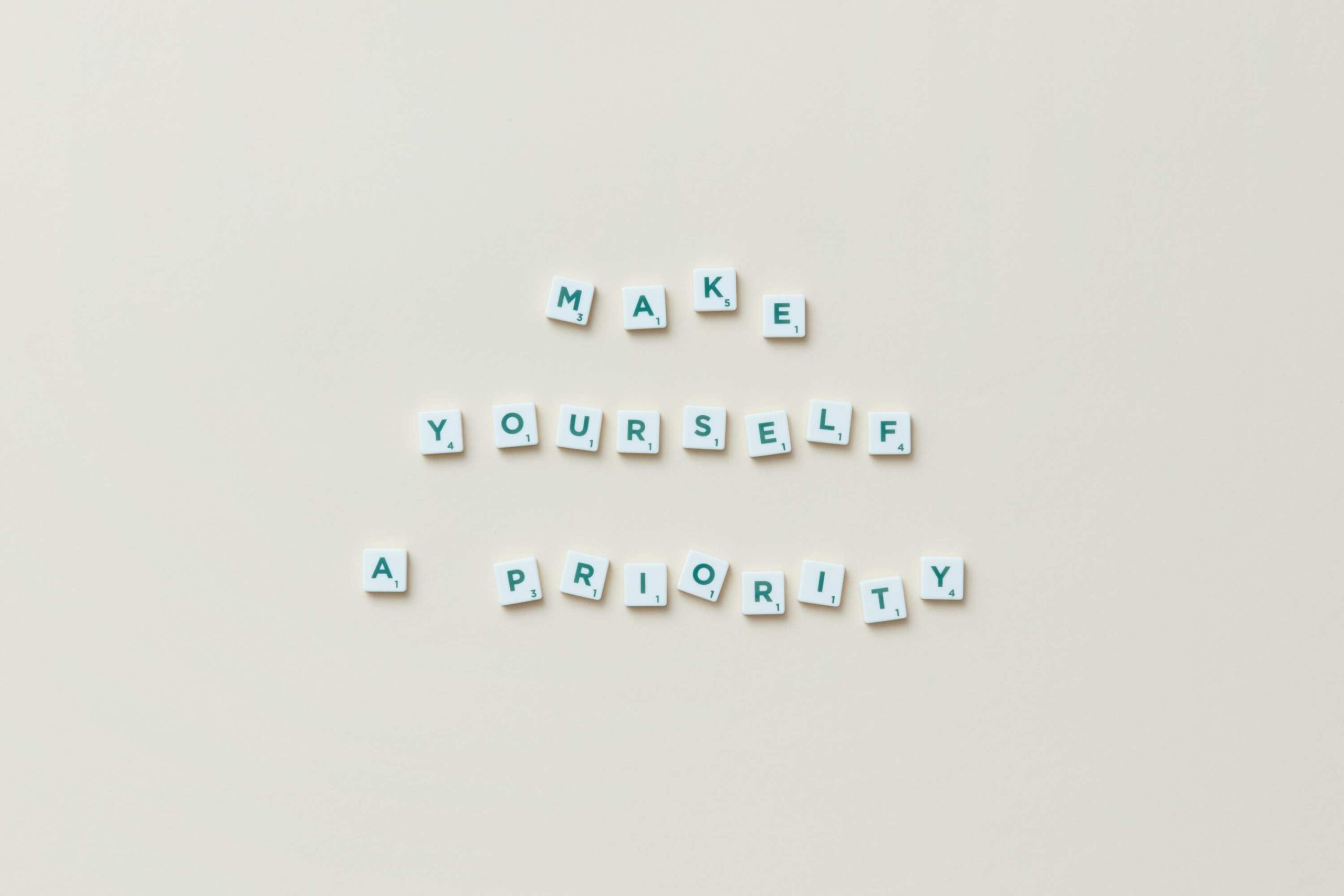
Common challenges (and how to move past them)
“I feel guilty prioritizing myself”
Why this happens: Years of believing that your needs don’t matter as much as everyone else’s. Society often teaches us that self-care is selfish, especially for women and people in caregiving roles.
The reality: When you take care of yourself, you have more to give others. Self-care isn’t selfish – it’s sustainable. You can’t pour from an empty cup.
How to shift this: Start small and notice the positive impact. When you’re well-rested, you’re more patient with your family. When you’ve honored your boundaries, you can be genuinely present instead of resentful.
Reframe: Instead of “I’m being selfish,” try “I’m modeling healthy behavior and ensuring I can show up fully for what matters.”
“I don’t know what I need”
Why this happens: You’ve spent so long focusing on others’ needs or pushing through discomfort that you’ve lost touch with your internal signals.
How to reconnect: Start small and pay attention to what makes you feel better or worse. Try different things – walking, journaling, resting – and notice what your body and mind respond to.
The experiment approach: For one week, try something different each day and notice your response:
- Day 1: Take a 10-minute walk.
- Day 2: Journal for 5 minutes.
- Day 3: Call a friend who makes you laugh.
- Day 4: Take a hot bath.
- Day 5: Spend time in nature.
Pay attention to which activities leave you feeling more energized, peaceful, or centered.
Remember: This is a process of rediscovering yourself, not a test you can fail.
“I’ve been critical of myself for too long”
Why this feels overwhelming: Self-criticism has become such an automatic habit that changing it feels impossible. You might even worry that being kinder to yourself will make you lazy or complacent.
The truth: Years of self-criticism won’t disappear overnight, but every kind thought and supportive action builds toward a new pattern. Research shows that self-compassion actually increases motivation and resilience, not decreases it.
How to start: Begin with one compassionate response today. Then another tomorrow. Small shifts create big changes over time.
The 1% approach: Instead of trying to transform your entire inner dialogue at once, aim to catch and reframe just one self-critical thought per day.
Progress example: Week 1, you catch yourself being harsh but don’t change it. Week 2, you catch it and try to reframe it. Week 4, the reframing starts feeling more natural. Week 8, you notice your default thoughts are becoming kinder.
Change takes time, but each small step matters. Remember that building a healthy relationship with yourself is a practice, not a destination.
Building a healthy relationship with yourself is part of a larger journey of self-discovery. If you’re ready to explore what might be holding you back from fully embracing yourself, take our ultimate self-discovery quiz to uncover your hidden barriers.

Practical exercises to strengthen your relationship with yourself
The daily check-in
Take 2-3 minutes each day to pause and ask:
- “How am I feeling right now?”
- “What do I need emotionally, physically, or mentally?”
- “What’s one way I can take care of myself today?”
This simple habit helps you stay connected to yourself throughout the day instead of running on autopilot.
Best times to practice: First thing in the morning, during lunch break, or before bed.
Gratitude for yourself
Each morning or evening, write down three things you appreciate about yourself. Focus on qualities, actions, or small wins that made a difference.
Examples:
- “I set a boundary with my coworker today, and it felt good to speak up for myself.”
- “I listened patiently when my friend needed support.”
- “I kept going even when I felt overwhelmed.”
Why this works: Most people are excellent at noticing their mistakes but terrible at acknowledging their strengths. This practice balances that tendency.
Mirror work (but make it real)
Stand in front of a mirror, look yourself in the eyes, and say something genuinely kind. It might feel awkward at first, but you’re practicing speaking to yourself with the same love you’d show someone you care about.
Start with: “I see how hard you’re trying, and I’m proud of you for that.”
Progress to: More specific affirmations based on what you’re working on or what you need to hear.
Create your self-care menu
Write down activities that genuinely make you feel better – not what you think should make you feel better. Include options for different time frames and energy levels.
5-minute options: Deep breathing, listening to one favorite song, stepping outside.
15-minute options: Hot shower, journaling, calling a friend.
30-minute options: Walk in nature, reading, creative time.
1-hour options: Bath and book, hobby time, social connection.
Commit to doing at least one thing from your list each week.
Reflection:
- What’s one self-care activity I can plan this week to help me recharge?
The positive effects of a healthy relationship with yourself
When you start treating yourself with kindness and respect, something interesting happens – everything else in your life starts to shift too.
Your relationships improve because you’re no longer looking to others to fill needs you won’t acknowledge or meet yourself. You become more authentic and less resentful.
Your decisions become clearer because you’re connected to your values and needs instead of just reacting to external pressures.
Your resilience increases because you have an internal support system instead of only external validation.
Your boundaries get stronger because you understand your own worth and won’t compromise it for temporary approval.
Your creativity and authenticity emerge because you’re not constantly criticizing or second-guessing yourself.
Building a healthy relationship with yourself doesn’t happen overnight, but every small step counts. By practicing self-compassion, respecting your needs, and celebrating your progress, you create a foundation of self-trust that supports everything else in your life.
You deserve your own love, care, and respect. When you build that foundation, everything else becomes stronger and more authentic.
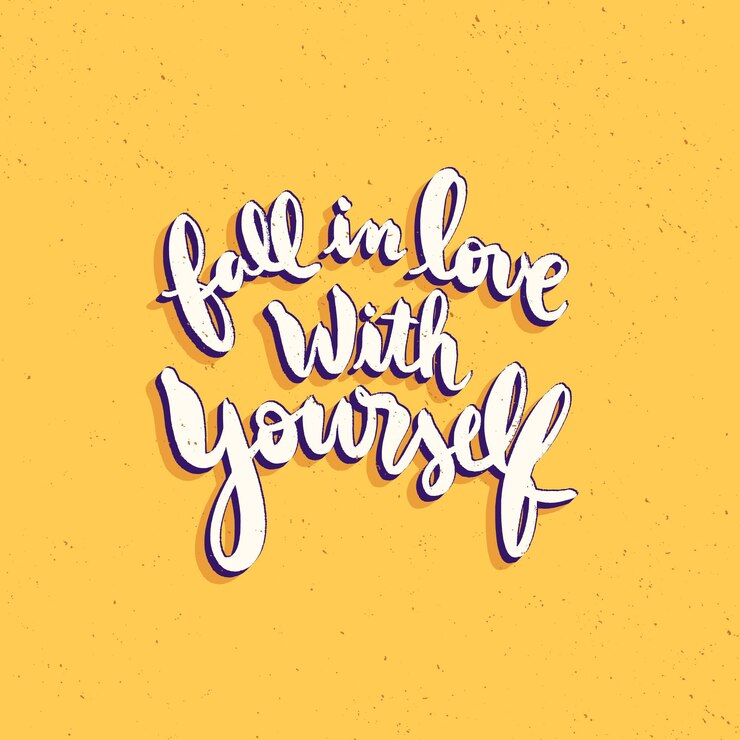
Ready to make this transformation real?
The concepts in this article are powerful, but real change happens when you have a structured system to turn insights into daily practice.
My Self-love rituals workbook gives you the daily structure to turn these concepts into lasting habits:
- Guided daily practices that help you reconnect with yourself,
- Reflection prompts to understand your needs and desires,
- Practical tools for building self-compassion into your routine
- Support for honoring boundaries and celebrating progress
Want the complete transformation? The Self-love bundle includes everything you need to build an unshakable foundation of self-love:
- Comprehensive self-compassion practices,
- Tools for transforming your inner critic,
- Extended exercises for discovering your authentic self,
- Everything you need to create a relationship with yourself that feels genuinely supportive.
Your relationship with yourself sets the tone for everything else. Make it one that supports the life you actually want to live.

